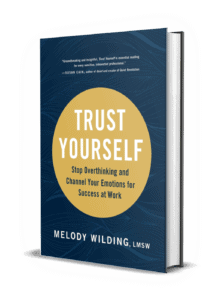Another meeting is coming up at work, and you’re dreading it. But if you want to get ahead, it’s important to speak confidently in meetings.
This is a goal one of my clients, Allison, had when she first started coaching. She came to me asking, “Why do I get so nervous before speaking in a meeting?”
Allison was an experienced cybersecurity professional – so highly regarded for her specialized expertise that she was recruited out of her current role into a new one.
Her new role was exciting and presented a huge opportunity for her career. But the thought of greater visibility made her impossibly anxious. The fear of speaking in meetings paralyzed her. Whenever it came time to contribute, Allison would freeze, overthink her response, and end up rambling.
Afterward, she’d beat herself up and feel like an imposter – incapable of doing the very job she had been recruited for. She desperately wanted to be more confident and less fearful in meetings and in her work overall.
Does Allison’s story sound familiar? If so, you’re far from alone.
Sensitive Strivers and Speaking Up in Meetings
Sensitive Strivers are high-achievers who are also highly sensitive. This describes 15-20% of the population who thinks and feels everything more deeply.
Common workplace situations might be moderately stressful to the average person can cause a Sensitive Striver to shut down, especially when overwhelmed. You bring many assets and talents to the table thanks to your ability to process information more thoroughly.
But it also means you are more susceptible to stress and emotional reactivity, particularly when it involves judgment or evaluation from others (like in a meeting or on a conference call).
Are You a Sensitive Striver?
You may be a Sensitive Striver if you agree with most of the following:
____I experience emotions to a high level of depth and complexity.
____I have a strong desire to “exceed expectations” in every aspect of my life.
____I have an inner critic that never takes a day off.
____I’m kind, compassionate, and empathetic to others.
____I often put other people’s needs ahead of my own.
____I’m easily impacted by stress.
____I struggle to “turn off” my mind because it’s constantly filled with thoughts.
____I have strong emotional reactions.
____I feel anxious when I’m caught off guard or know I’m being watched or evaluated.
____I hold myself to high standards and judge myself harshly if I make mistakes.
____I often get stuck in indecision and analysis paralysis.
____I take feedback and criticism to heart.
Meetings can be tough environments for Sensitive Strivers because:
- You genuinely enjoy listening to others’ ideas
- You prefer to observe and absorb what’s happening before offering an opinion
- You have a high sense of responsibility so you show respect by deferring to the leaders at the table
- You tend to be more reserved, which mean more outgoing co-workers may dominate the discussion
- You are overwhelmed more easily and may freeze under pressure
- You are able to think deeply and see all sides of a situation, which can lead to overthinking
- You are so empathetic that you worry about what other people think of you
Free GUIDE
7 Strategies to Speak Up With Confidence
Don’t sit through another meeting paralyzed by fear. Get the guide leaders at Google and Facebook use to voice their opinions with confidence.
Unsubscribe at any time. Your details are protected in accordance with my Privacy Policy.
Strategies to Speak Confidently in Meetings
Sitting frozen and fearful through yet another meeting is a terrible feeling. Take heart, because it doesn’t need to be this way. It is entirely within your power to take control and ditch a habit of staying silent so you can get ahead.
Elevating your visibility at work is essential if you want your career to evolve and grow. You work hard and have great ideas to contribute—you should be making an impact and getting the recognition you deserve.
With a little practice from these tips, you’ll finally feel like the integral team member you’ve always been.
1. BANISH PRE-MEETING JITTERS
Your hands are shaky. Your stomach is doing somersaults. You suddenly start second-guessing if you spelled the client’s name correctly on the agenda. These are common pre-meeting anxieties. It’s normal to experience anticipatory stress when you feel as if your intelligence or contributions are being evaluated.
Instead of impugning your jitters as a sign that you’re inadequate or otherwise not up to the task at hand, Stanford psychologist Kelly McGonigal suggests befriending your stress response, reframing it as a sign you’re ready for action and prepared to bring your best to the (conference) table.
It’s also essential to bring down your baseline level of stimulation before a meeting. Allison, the client I told you about in the story earlier, would use box breathing to shift from nervous to calm.
2. EASE INTO IT
It may be tempting to arrive right before a meeting starts to appear prompt or avoid awkward small talk. But if you feel rushed or short on time, this will only exacerbate the existing stress you already feel during meetings.
Instead, build in a buffer and plan to settle in before things get underway. Give yourself the opportunity to ease into the physical meeting space. If it’s a virtual teleconference, get comfortable with the webinar controls, your mic, and webcam ahead of time.
As colleagues arrive, focus on making conversation with one or two people at a time, which can feel both socially fulfilling and less overwhelming. You’ll also already have an “in” of sorts as the meeting begins and the conversation turns towards agenda items. This can help ease anxiety and make speaking up for the duration of the session seamless.
3. COMMIT TO SPEAKING EARLY
Have you ever come to a meeting with ideas and plan for what you want to say, then left realizing you said nothing the entire time? While you’re not alone, staying quiet is doing yourself a disservice. It typically gets more difficult to enter the conversation as a meeting progresses. The longer you wait, the more your anxiety will build.
Growth often comes from discomfort, so push yourself to speak up early. Set a simple strategy to say something in the first 10 to 15 minutes of the session–whether it’s to welcome attendees, present your main argument, ask a question or offer an opinion on a new business proposal. It’s a surefire way to ensure you contribute.
4. USE YOUR STRENGTHS WHEN SPEAKING UP
You don’t have to be the loudest in the room. Even soft-spoken Sensitive Strivers can still make an impact by backing up a coworker’s comment with a simple, “Great idea! I can see that working really well.”
You can also focus on asking powerful questions. As a Sensitive Striver, you’re very observant, which gives you an edge when it comes to posing the kind of thought-provoking questions that haven’t crossed your colleagues’ minds quite yet.
Another way powerful to increase your impact and visibility even after the meeting wraps is by following up with an email to your boss summarizing key points raised, or better yet, providing a proposal for a new project sparked by the conversation. You’ll build up a reputation as someone who makes useful contributions and you’ll come to everyone’s mind more quickly when promotion time comes around. More importantly, you’ll gain confidence in yourself.
This is exactly what Allison did within the first weeks of starting her job. Armed with the new tools and courage she gained through coaching, she was soon able to say, “I’m proud of how confident and competent my new colleagues perceive me to be. But most importantly, I value myself.”
5. BE THE ONE TO TAKE ACTION ON “NEXT STEPS”
Did something come up in the meeting that could use more research? Commit to taking on something for the next meeting. It shows you have initiative and that you’re interested and invested in your organization.
This is a great example of employing a pre-commitment device, a habit formation technique you can use to nudge yourself towards behaviors you desire. You’ve committed yourself—now you’ll be more motivated and likely to follow through.
6. CHALLENGE YOUR BELIEFS ABOUT CONTRIBUTING
Many people’s leadership instincts may not have been nurtured to their full potential in childhood, and subconscious insecurities can seep into our behavior to this day when it comes to speaking up. So how do you overcome old, outdated scripts holding you back from feeling confident about speaking up? It requires a deep-dive into your presumptions about self-worth and speaking up.
Growing up, what were you told about standing out? Were you given the message by your parents, teachers, and community that you could be whatever you wanted, or did you internalize concepts like, “People won’t like you if you try to stand out”?
If you find yourself easily devastated by real or imagined negative feedback should you express your ideas, consider that you may be reverting back to an immature identity when your self-esteem was more contingent on others’ (especially that of authority figures’) opinions.
When you have a point to make yet find undermining thoughts creeping in, thank your inner critic for trying to do its job by keeping you protected. Fear can signal you’re saying something of significance. Seize the moment. Stop playing small. Remember, you’re part of your organization because you’re qualified, you’re effective, and you matter.
As a Sensitive Striver, you’ve got a lot to offer. Now it’s time to let everyone know it.
Check out the Ultimate Guide for Sensitive Strivers for free resources to outsmart imposter syndrome, stop second-guessing yourself, and much more.
Free GUIDE
7 Strategies to Speak Up With Confidence
Don’t sit through another meeting paralyzed by fear. Get the guide leaders at Google and Facebook use to voice their opinions with confidence.
Unsubscribe at any time. Your details are protected in accordance with my Privacy Policy.









